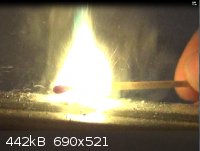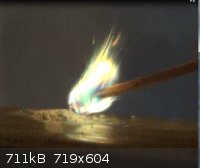
Tdep - 13-6-2013 at 01:35
I've read in places that zinc peroxide can be formed by the reaction of either the zinc chloride, oxide, acetate or ammomonical sulphate with hydrogen
peroxide.
But has anyone actually tried this? If so, which of these did you use and was it as simple as mix with H2O2 in excess and heat, waiting for the yellow
precipitate?
Finnnicus - 13-6-2013 at 02:11
I really doubt that. I believe it would be more like the production of sodium peroxide. Here.
Terribly sorry. You are correct zinc chloride and hydrogen peroxide react. Wonder if the oxygenated melt would work for zinc?
[Edited on 13-6-2013 by Finnnicus]
Adas - 14-6-2013 at 12:52
Actually this should work with ZnO, with Zn salts you should have to use NH3, too. With Ca salts this works.
Tdep - 14-6-2013 at 19:49
I've seen many reports that it should work, but has no-one tried it? I don't get how it would work as ZnO is insoluable and so it the ZnO2, so how
does one go about seperating the two?
Also, there is this http://patentimages.storage.googleapis.com/pages/US4172841-3...
which describes a zinc acetate-peroxide sort of complex, no-one has tried this? Is it even energetic?
[Edited on 15-6-2013 by Tdep]
DubaiAmateurRocketry - 14-6-2013 at 22:41
Zinc peroxide can be synthesized through the reaction of zinc chloride and hydrogen peroxide.[3]
^ On wiki, i believe that true...
So...
Any ways i can make Zinc chloride ? How to make it, I have Zinc, Sodium chloride, Potassium chloride, I have many copper salts. So i blieve Copper
sulfate and sodium chloride makes Copper II Chloride ????
And if so Zn + CuCl2 --> ZnCl2 + Cu Right ?? Ok plz some one confirm i really want to make zinc peroxide 
Tdep - 16-6-2013 at 02:28
Well zinc + HCl seems the first option but yes, CuCl2 + Zn would work, provided you drived it to completion.
Nitro-esteban - 20-6-2013 at 13:19
I tried reacting a ZnCl2 solution with 3% hydrogen peroxide and the miture turned a bit orange but there was no precipitate. I made the ZnCl2 by
reacting zinc and hydrochloric acid. Zn + 2 HCl = ZnCl2 + H2.
Tdep - 20-6-2013 at 15:44
I have a solution of zinc chloride in 6% peroxide that has no visable change to it after two days in the fridge.
The zinc chloride was made from ZnCO3 and HCl
Success!
Tdep - 27-6-2013 at 16:45
So I kept a suspension of zinc oxide in 80ml of 6% H2O2 and after a week the colour of the oxide gradually shifted to a yellow and it most certainly
kicks up a fuss when exposed to an open flame. I am most confident this is zinc peroxide.
Here is a picture of it burning when I put a match on it. You can sort of see the blue-green flame colour (it was much more apparent in person). This
is characterisic of zinc metal burning from experience, but is zinc metal one of the products of decompostion? I assumed it went:
2ZnO2 --> 2ZnO + O2
But does it actually more go:
ZnO2 --> Zn + O2 ?
Obviously the zinc burns instantly but still...


Preparation of Zinc peroxide
symboom - 25-1-2014 at 19:02
AS from this patent
Preparation of Zinc Peroxide
In a 6-liter three-necked flask equipped with an agitator, a contact thermometer, a reflux condenser, and a dropping funnel, 1438 g (5 moles) of
ZnSO4.7H2 O is dissolved in 750 ml of water under heating and to this solution 1.5 liters of a concentrated solution of ammonia in water is quickly
added. During this step, the precipitated Zn(OH)2 is redissolved. At a temperature of 80.degree. C., 1.5 liters of 30% strength H2 O2 is added in
increments of, respectively, 100 ml so rapidly that frothing remains under control. The temperature can also be maintained at 95.degree.-100.degree.
C. up to a vigorous refluxing of the solution. This procedure lasts about 1 hour. After the addition of H2 O2 is completed, the mixture is stirred for
another 10 minutes, then vacuum-filtered in the hot state, and washed with water until the filtrate is free of sulfate. The residue is dried at room
temperature. The following table gives the yields and a number of properties of the resulting zinc peroxide in dependence on the reaction temperature
thhere seems to be able to use zinc chloride too
i seem to be having dificulty in forming zinc peroxide
first wikipedia states add hydrogen peroxide zinc chloride
which it not clear hasanyone have had sucess in this
Tdep - 26-1-2014 at 00:10
I did succeed in making this, via a suspension of ZnO in 6% peroxide. However, I found it impossible to extract the resultant peroxide from any
unreacted ZnO, which I really think limited its properties.
http://www.sciencemadness.org/talk/viewthread.php?tid=24626#...
AJKOER - 27-1-2014 at 19:14
Is it possible to improve the preparation of this and other peroxides by limiting water. The logic is that since ZnO2, CaO2,... all start to decompose
in water, why use a largely water based path?
For example, in place of watered down H2O2, try to dissolve 2Na2CO3.3H2O2 in the cold concentrated NH3 solution of Zn(OH)2. Then, separate out the
ZnO2 to limit decomposition.
I may have an opportunity to test/experiment this preparation variation, which is less expensive than using 30% H2O2 with possibly better results than
using dilute H2O2.
[EDIT] Here is a possible variation on my modified preparation: replace concentrated ammonia with a warm concentrated aqueous solution of NH4Cl in the
presence of Na2CO3. Expected reaction employing an excess of NH4Cl in the dark (if this reaction is to continue over days, best to limit any possible
photolysis side reactions between ammonia and oxygen forming nitrates):
2 NH4Cl (aq) + Na2CO3. 3/2H2O2 (s) + Zn(OH)2 (s) ---> 2 NaCl (aq) + (NH4)2CO3 (aq) + Zn(OH)2 (s) + 3/2 H2O2 (aq)
and on warming:
(NH4)2CO3 (aq) --> 2 NH3 (g) + H2O (g) + CO2 (g)
However, not sure if it is best to warm the solution as it could contribute to the decomposition of the ZnO2, and more immediately, while fostering
the ammonium complex formation with Zn(OH)2 and the overall reaction, at over 50 C, a side reaction between H2O2 and NH3 may occur (forming nitrite
and potentially liberating volumes of N2 gas with time).
[Edited on 28-1-2014 by AJKOER]
symboom - 29-1-2014 at 12:23
strangely enough i dont see the same reaction working for zinc peroxide as it does for the synthesis of silver peroxide reaction of silver nitrate
with persulfate salt forming nitric acid, sodium sulfate and silver peroxide
http://www.youtube.com/watch?v=1_a81M9p2so
here is the video of silver peroxide synthesis
[Edited on 29-1-2014 by symboom]

